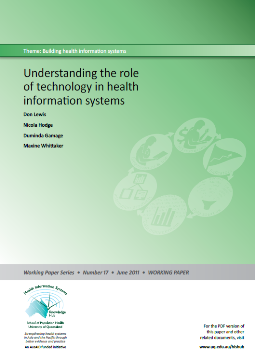Authors: Don Lewis, Nicola Hodge, Duminda
Gamage, &Maxine Whittaker
This article is
concerned with the uptake of information communication technology in health
care, specifically in the Pacific region. The article seeks to address the
number of failed ICT projects in the health sector with by focusing on four
main areas, however due to space constraints this review will primarily focus
on the two factors that have wider relevance to ICT developments in industries
other than health. Understanding the market you are designing an ICT solution
for, in this case small pacific nations; and the critical factors in success or
failure of ICT implementation. This review will also attempt to detail
shortcomings in the article as well as providing suggested improvements for
further studies on the topic.
One if the issues
highlighted in the article is the need to have a strong understanding of the
market you are trying to introduce ICT’s into. The context of the Pacific
island countries and territories is one of dispersed and small populations,
with the exception of Papua New Guinea, small remote island nations and
territories, separated by vast ocean distances. While these factors would
indicate that ICT’s have the potential to be instrumental to social and
economic development, they also represent great challenges in its
implementation and upkeep. Additionally the vast variation in population
between Papua New Guinea on 6,000,000 and Tokelau at below 2000, indicates
vastly different needs in terms of the complexity and sophistication of ideal ICT
solution for their health care system (Lewis et al 2011 p5). The article also looks
at some of the common factors that can influence the success or failure of a health
ICT project, including but not limited to lack of senior management support;
lack of engagement of clinicians and other end users; inadequate specification
of requirements, and insufficient time and resources allocated to
organisational and process change. It also looks at issues that are specific to
projects in the developing world, “Poorly planned interventionist behaviour
that ignores user needs, fails to understand host capacities, demands action,
neglects cultural constraints and ignores the local knowledge base will only
result in failure for health technologies” (Rodrigues et al qtd in Lewis et al 2011
p.13).
I felt the issues raised
in the article were well considered and addressed thoroughly. Having been
through several changes of information
management systems, in a range of organisations, my
only recommendation for further research would be that this kind of consultation
process was part of the implementation of ICT projects in industries other than
health care.
This article
represents a clear evaluation of the issues involved in the implementation of
ICT health –care solutions specific to the Pacific island countries and
territories. It considers carefully the potential causes for failure of the
project, and offers clear paths for success. Technology has an undeniable place
in the future of medical care.
Article Reference
Lewis, D., Hodge, N., Gamage, D & Whittaker, M. (2011) Understanding
the role of technology in health information systems. Available from the
University of Queensland Health Information Systems Knowledge Hub at http://www.uq.edu.au/hishub/wp17


No comments:
Post a Comment